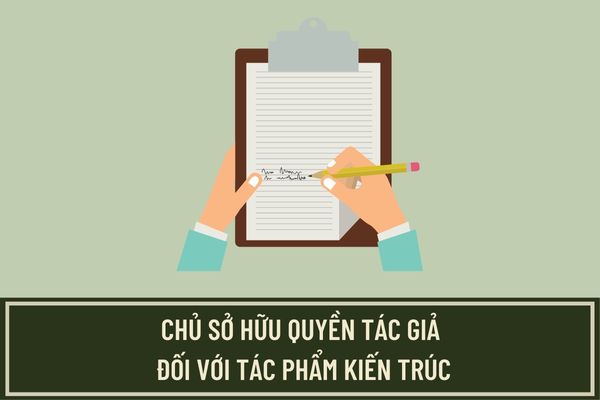Vietnam: What rights do copyright owners for architectural works enjoy under the latest regulations?
What rights do copyright owners for architectural works enjoy under the latest regulations?
Pursuant to Article 11 of Decree No. 17/2023/ND-CP stipulating this content as follows:
Copyright in architectural works
1. An author who is also a copyright owner shall enjoy the moral rights specified in Article 19 of the Law on Intellectual Property and the economic rights specified in Article 20 of the Law on Intellectual Property.
2. Authors who are not concurrently copyright owners are entitled to the moral rights specified in Clauses 1, 2 and 4, Article 19 of the Law on Intellectual Property; Copyright owners are entitled to the rights specified in Clause 3, Article 19 and Article 20 of the Law on Intellectual Property.
3. Authors and organizations and individuals that invest financially and in material and technical foundations to create architectural works may agree on the repair of architectural works.
Thus, copyright owners for architectural works are entitled to the moral rights specified in Article 19 of the 2005 Law on Intellectual Property in Vietnam and the economic rights specified in Article 20 of the 2005 Law on Intellectual Property in Vietnam.
Authors who are not concurrently copyright owners are entitled to the moral rights specified in Clauses 1, 2 and 4, Article 19 of the 2005 Law on Intellectual Property in Vietnam; Copyright owners are entitled to the rights specified in Clause 3, Article 19 of the 2005 Law on Intellectual Property in Vietnam and Article 20 of the 2005 Law on Intellectual Property in Vietnam.
Vietnam: What rights do copyright owners for architectural works enjoy under the latest regulations?
What are the regulations on moral rights in intellectual property?
Pursuant to Article 19 of the 2005 Law on Intellectual Property in Vietnam (amended by Clause 5, Article 1 of the 2022 Law on Amendments to some articles of the Law on Intellectual Property) stipulating as follows:
Moral rights
Moral rights of authors include:
1. The right to name their works.
Authors are entitled to transfer the right to name their works to other organizations and individuals as prescribed in Clause 1 Article 20 of this Law;
2. The right to have their real names or pseudonyms attached to their works; the right to have their real names or pseudonyms announced when their works are published or used;
3. The right to publish or permit other persons to publish their works;
4. The right to protect the integrity of their works; and to forbid other persons to modify, edit or distort their works in whatever form, causing harm to the honor and reputation of the author.
Thus, moral rights of authors include:
- The right to name their works.
- The right to have their real names or pseudonyms attached to their works; the right to have their real names or pseudonyms announced when their works are published or used;
- The right to publish or permit other persons to publish their works;
- The right to protect the integrity of their works; and to forbid other persons to modify, edit or distort their works in whatever form, causing harm to the honor and reputation of the author.
What are the regulations on economic rights of authors?
Pursuant to Article 20 of the 2005 Law on Intellectual Property in Vietnam (amended by Clause 5, Article 1 of the 2022 Law on Amendments to some articles of the Law on Intellectual Property) stipulating the economic rights of authors as follows:
Economic rights
1. Economic rights of authors include:
a) The right to create derivative works;
b) The right to publicly perform their works, whether directly or via audio and video recordings or any technological devices, at a location that is publicly accessible but the public cannot select the time and part of the works.
c) The right to directly or indirectly reproduce the entire or part of the work using any means or form, except for the cases specified in Point a Clause 3 of this Article;
d) The right to distribute, import for public distribution by sale, or transfer of other rights to ownership of the original or copies of their works in tangible forms, except for the cases specified in Point b Clause 3 of this Article;
dd) The right to broadcast, communicate to the public their works by wireless or wired devices, electronic information networks or other technical means, including the provision of their works to the public in a manner that it can be accessed by the public at their time and location of choice;
e) The right to lease the original or copies of cinematographic works and computer programs, unless these computer programs are not the main subject matter of the lease.
2. The rights specified in Clause 1 of this Article shall be exclusively exercised by the author or copyright owner, or by another organization or individual under authorization of the author or copyright owner.
When any organization or individual exercises one, several or all of the rights stipulated in Clause 1 of this Article and Clause 3 Article 19 of this Law, such organization or individual must ask for permission from the copyright owner, pay royalties and other material benefits to the copyright owner, except in the cases specified in Clause 3 of this Article, Articles 25, 25a, 26, 32 and 33 of this Article. In case a derivative work is created in a manner that affect the moral rights specified in Clause 4 Article 19 of this Law, the author's written consent must be obtained.
3. The copyright owner does not have the right to prohibit other organizations and individuals from:
a) Reproducing the work only for exercising other rights prescribed by this Law; temporarily reproducing the work following a technological process during the operation of the devices in order to transmit within a network between third parties via intermediates, or legally using the work without independent economic purposes and the copy is automatically deleted and cannot be recovered;
b) Subsequent distribution, import for distribution of the original or copy of a work the distribution of which has been carried out or permitted by its copyright owner.
Thus, the economic rights of authors include:
- The right to create derivative works;
- The right to publicly perform their works, whether directly or via audio and video recordings or any technological devices, at a location that is publicly accessible but the public cannot select the time and part of the works.
- The right to directly or indirectly reproduce the entire or part of the work using any means or form, except for the cases specified in Point a Clause 3 of this Article;
- The right to distribute, import for public distribution by sale, or transfer of other rights to ownership of the original or copies of their works in tangible forms, except for the cases specified in Point b Clause 3 of this Article;
- The right to broadcast, communicate to the public their works by wireless or wired devices, electronic information networks or other technical means, including the provision of their works to the public in a manner that it can be accessed by the public at their time and location of choice;
- The right to lease the original or copies of cinematographic works and computer programs, unless these computer programs are not the main subject matter of the lease.
LawNet
